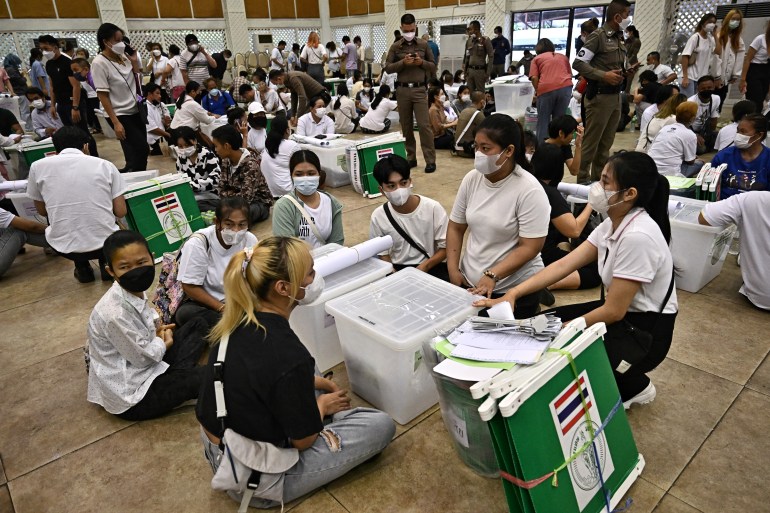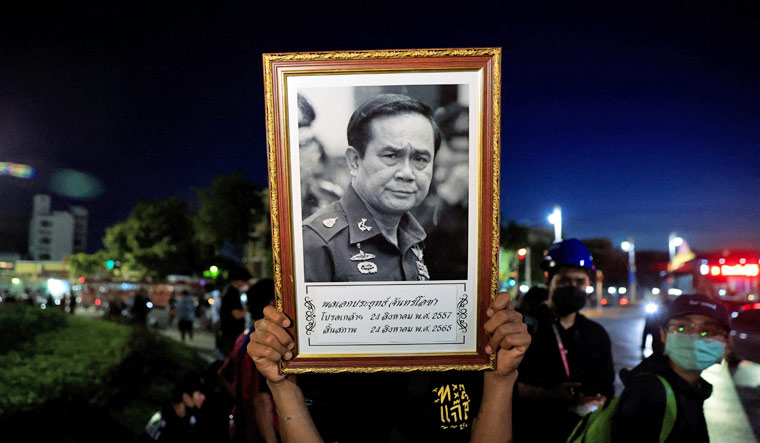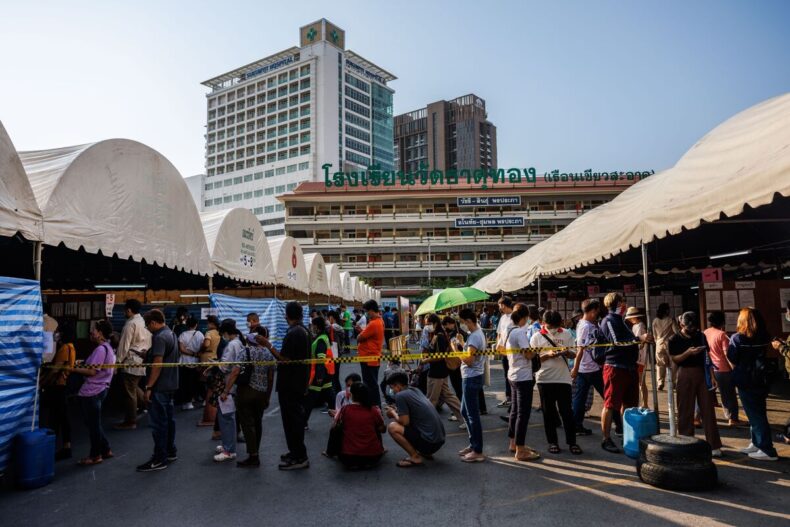The election is the first in the nation of Southeast Asia since a youth-led rebellion in 2020, which broke long-standing taboos by demanding limits on King Maha Vajiralongkorn’s power and an end to nearly a decade of military support for the government.

In what some have dubbed the “most important election to date” in Thailand, voters will go to the polls on Sunday to choose a new parliament.
With public opinion polls continuously forecasting a majority for the main opposition Pheu Thai Party and the youth-led Move Forward Party (MFP), the vote on Sunday is poised to offer a strong mandate for change.
However, concerns about the royalist-military establishment trying to hold onto power continue. In the last 20 years, the military has carried out two coups, while three prime ministers have been overthrown by the judiciary, and various opposition parties have been disbanded.
Pheu Thai vs. MFP: Rival Reformist Parties Battle for Change in Thailand’s Polls
Pheu Thai (For Thais), the opposition party affiliated with self-exiled billionaire Thaksin Shinawatra, whose overthrow in a coup in 2006 ignited Thailand’s political unrest, is currently leading the polls. Despite Thaksin’s downfall, the telecom tycoon’s affiliated parties have won every election since, twice by landslides.
Their good electoral performances were a result of pro-poor programmes including debt relief for farmers and universal healthcare.
Pheu Thai is once again promising to increase social programmes and boost Thailand’s pandemic-affected economy, notably by providing 10,000 baht ($295) in handouts for those who are 16 years of age and older.
Paetongtarn Shinawatra, Thaksin’s 36-year-old daughter, is currently in charge of the party.

Paetongtarn exhorted thousands of red-clad followers to vote Pheu Thai in order to win by a landslide and “better the lives of the people” during the party’s final rally outside of Bangkok, the Thai capital.
In the polls, MFP, which is led by 42-year-old businessman Pita Limjaroenrat, is not far behind Pheu Thai.
The progressive party has made democratic reforms a priority, promising to rewrite the draconian lese majeste laws that punish insults to the king with up to 15 years in prison, eliminate military conscription, and scrap Thailand’s constitution, which was drafted by the military.
With the most recent surveys indicating that the public favours the flamboyant Pita for the role, he has experienced a rise in support in recent weeks. He has drawn sizable youthful crowds to his campaign rallies.
The United Thai Nation Party (UTN), led by Prime Minister Prayuth Chan-ocha, is competing against the two reform parties.
A distant third in the polls is the nationalist conservative party, which supports ideals like harmony, peace, and reverence for the monarchy.
Prayuth, who originally came to power in a coup in 2014, warned followers against “harmful” and “revolutionary change” as his campaign came to a close on Friday. He also urged the masses, which were mainly older, to defend the “values of Thais”.
Election Scenarios Unveiled: Prayuth’s Return, Opposition Coalition, or Pragmatic Partnership?
There are three main scenarios being considered by analysts: Prayuth’s potential return with Senate support, a coalition between Pheu Thai and MFP, or a partnership between Pheu Thai and the smaller Palang Pracharat Party.

If the first scenario materialises, it would result in a minority government.
According to Thitinan Pongsudhirak, an international relations professor at Chulalongkorn University in Bangkok, this would lead to an unstable government, legislative gridlock, and the possibility of government collapse during crucial votes. However, the Prayut-led regime might be determined to keep Move Forward and Pheu Thai out of power and prefer to deal with challenges one step at a time.
As for the second scenario, its success is doubtful unless the opposition achieves a landslide victory. This is because the appointed senators are likely to block a Pheu Thai-MFP government due to their opposition to the smaller party’s radical reform agenda.
Therefore, the remaining option is a potential coalition between Pheu Thai and Palang Pracharat.
According to Thitinan, the third plausible scenario is the most pragmatic. Prawit, the leader of Palang Pracharat, is a former general, and a potential agreement between the two parties “would divide the Senate vote and potentially be acceptable to the palace.”
Thitinan referred to the upcoming Sunday’s vote as “the most crucial election in Thailand’s history.”
He mentioned that unless the election results are clear and indisputable, the process of forming a government after the election could become prolonged and mired in a stalemate, allowing Prayut to remain in power temporarily.
However, if the choice made by the electorate is overwhelming and indisputable, it would be difficult to manipulate or overturn the outcome. Given the history of military coups and judicial dissolutions in recent times, such an attempt is likely to spark social unrest, making the future uncertain.
A breakdown of the election
In Thailand’s general election on May 14, voters who are fed up with nine years of plodding rule by a coup-planning army general are anticipated to give a clear mandate for change. However, an anticipated victory by Thaksin Shinawatra’s allies has raised concerns for an unencumbered democratic transition since his overthrow by force 17 years ago plunged the nation into protracted instability.
Due in part to the weak economy and his administration’s poorly executed response to the COVID-19 outbreak, Prayuth Chan-Ocha, the incumbent prime minister who is seeking re-election, is facing significant levels of dissatisfaction. Following a coup in 2014, Thailand is holding elections almost ten years after having a government supported or headed by its royalist military.
52 out of Thailand’s 65 million people, or close to 80% of the population, are of voting age. Two ballots will be available to voters: one will be for a local constituency representative and the other will be for the national party of their choice.
The 250-seat Senate in Thailand was not elected; instead, its members were chosen by Prayuth’s junta. The 2017 constitution, which was adopted during military rule, stipulates that the prime minister must be chosen by a vote of both the 500-member House and the Senate. A candidate for prime minister may be chosen by parties with more than 25 MPs. The newly elected members of the House will then cast their votes for these candidates. The victorious candidate must receive the support of more than 50% of the total votes from both chambers or at least 375 members.












